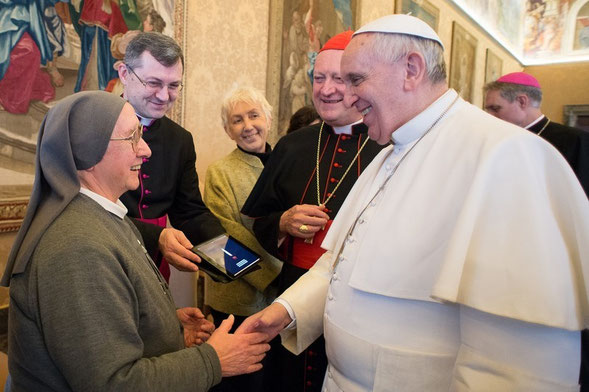Last week Offer Stern-Weiner, Head of the Modern Slavery Unit at the Home Office, and I journeyed out of Rome to visit a small and tranquil convent in a historic town set in the beautiful Italian countryside. The reason we were there? To meet five young Nigerian women who had been trafficked from Nigeria to Italy and who had been offered shelter by the nuns. For the next couple of hours we listened as they told us about their journey through the desert to Libya, and across the Mediterranean in a flimsy inflatable boat. They told us how they had been promised work, only to find out in Libya that this work was prostitution. The traffickers only revealed in Libya that the price of the journey was €35,000, to be repaid through earnings. By then there was no way back. They were held imprisoned in Libya for several months, and then sent on to Italy. They had been rescued by the police and the nuns, who were providing them with education, helping them get documents, and encouraging them to plan for their futures.
Earlier on the same day we had met colleagues from the Vatican, religious orders and other embassies to the Holy See to discuss how we could better tackle modern slavery together. There were many ideas: creating alternative employment in countries of origin; running awareness-raising campaigns in recruitment areas; targeting clients; and consistently implementing existing legislation. The comment that struck me most was from one of the religious sisters, who said that as criminal networks are working together to exploit the vulnerable, good people had to work together to fight them.
Modern slavery is a global problem fuelled by organised crime, conflict, migration, and developed economies’ demand for low cost manufactured products. It is estimated that there are 10,000-13,000 people in conditions of slavery in the UK, and 45 million worldwide. They include girls forced into prostitution (like the Nigerians we met), people working for little or no wages, child labour and even organ harvesting. The UK Prime Minister Theresa May has made it a top priority to tackle modern slavery – aiming to eradicate it in the UK and overseas. The UK Government has passed a Modern Slavery Act, given law enforcement new powers and additional resources to disrupt slave-drivers, improved protection and support to victims, introduced new duties on state and private sector organisations to shine a light on the issue, and appointed an Independent Anti-Slavery Commissioner. This has resulted in record numbers of victims coming forward to ask for help as well as increased numbers of prosecutions and convictions for slave-drivers, and the Prime Minister is personally chairing a national taskforce to accelerate progress.
The Pope of course has also spoken out many times against modern slavery. The bishops have taken action: Cardinal Nichols set up the Santa Marta Group, which brings together bishops, police chiefs and politicians from around the world to cooperate against modern slavery. The Church is active in many other ways too. Sister Eugenia Bonetti, who took us to the shelter, has worked for decades to rescue girls from trafficking in Italy and help them leave prostitution. The nuns have set up their own network of networks against modern slavery called Talitha Kum, a phrase from the Gospels meaning ‘Little girl, arise’ in Aramaic. The network spans 70 countries.
Eradicating modern slavery will not be easy. The Nigerian women in the shelter told us that they now felt safe from the traffickers who had brought them to Italy, but they were deeply worried about their families at home, who were being threatened by the criminal networks. Nor will rehabilitating them be easy. They could not read and could not speak Italian. The nuns were working with them every day to help them to acquire the skills they will need to move on with their lives.
At the end of the visit we were full of admiration for the sisters who work with the victims, and who devote their lives to fighting this injustice. The challenge now is to set up those networks of good people that the sister recommended – including governments, police forces, business leaders, the churches and religious networks – to work together to make a real difference on the ground. The UK’s International Modern Slavery Strategy provides a good starting point.

